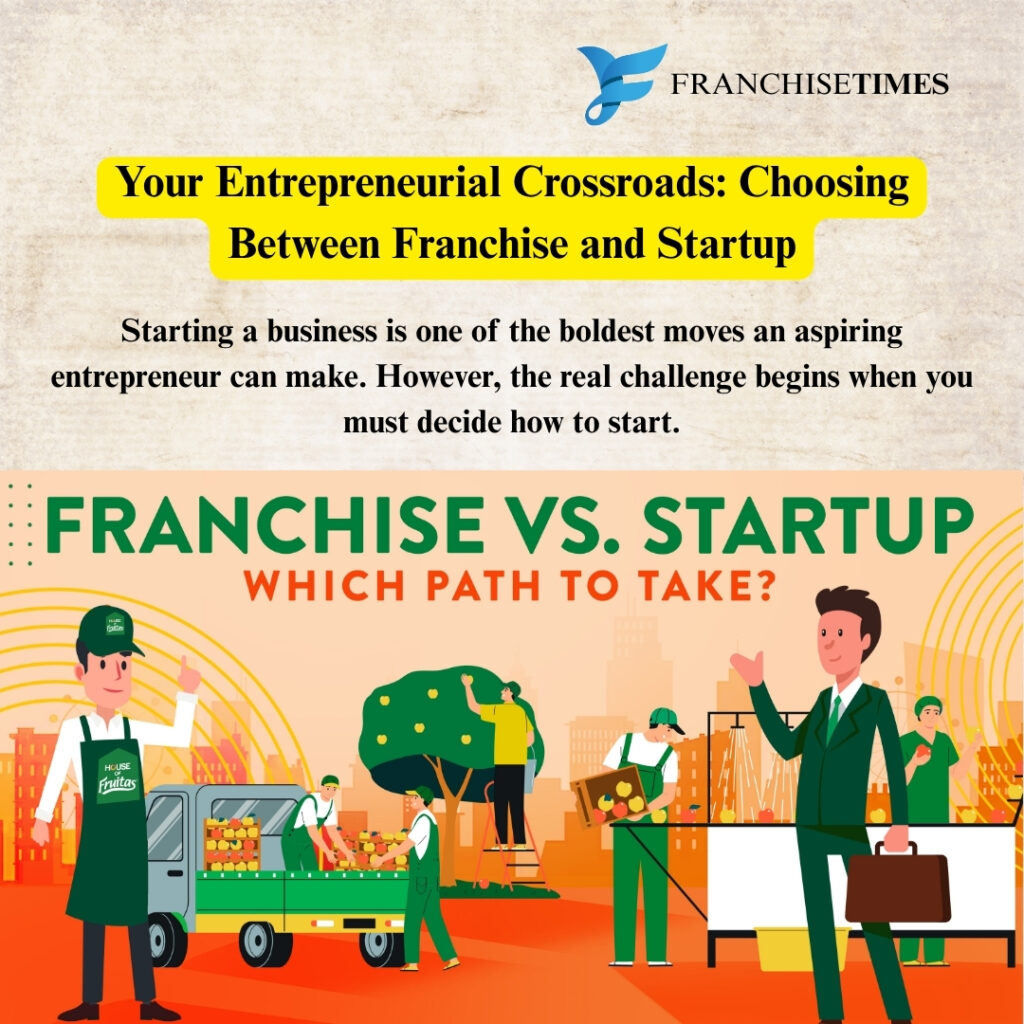Your Entrepreneurial Crossroads: Choosing Between Franchise and Startup
Starting a business is one of the boldest moves an aspiring entrepreneur can make. However, the real challenge begins when you must decide how to start. Should you build something from scratch or take the franchise route? This decision often shapes not just your business model but also your lifestyle, goals, and growth trajectory. For first-time entrepreneurs, this question is even more critical. That’s why comparing a Franchise vs Startup Decision is essential before jumping in.

Let’s dive deep into both models and help you determine which fits your dreams and resources best.
1. Understanding the Core Difference: Franchise vs. Startup
At a basic level, the distinction is straightforward. A franchise involves buying into an existing, proven business model. A startup, on the other hand, is about launching a new business from the ground up.
When you buy a franchise, you get a brand name, systems, support, and often a built-in customer base. You’re entering an ecosystem that already knows how to operate efficiently. In contrast, a startup gives you the freedom to innovate, experiment, and create your own identity. However, it also comes with higher uncertainty.
While both offer potential, they cater to different types of entrepreneurs. If you value structure, guidance, and reduced risk, franchising might appeal to you. Conversely, if you crave autonomy, creativity, and a chance to disrupt the market, a startup might be your calling.
Although they seem different, both models require dedication, planning, and strong execution.
2. Risk and Reward: Assessing the Financial Implications
When evaluating Franchise vs Startup Decision, risk and reward play a vital role. Startups usually demand higher initial risk. There’s no roadmap, no known audience, and no established brand to fall back on. Consequently, failure rates are significantly higher. According to various reports, nearly 90% of startups fail within the first five years.
Franchises, however, offer more predictable returns. You’re investing in a proven business formula. The parent company has already done market research, developed operational processes, and built brand awareness. That’s why franchise failure rates are notably lower than startups.
But there’s a trade-off. Franchises often involve upfront fees, royalty payments, and marketing contributions. These recurring costs reduce your profit margins. Yet, for a first-time entrepreneur, the reduced risk and access to mentorship might justify the investment.
Moreover, if you’re bootstrapping your venture, launching a small startup with minimal resources can be easier than buying a franchise.
In both scenarios, a detailed business plan is a must. Cash flow, revenue projection, breakeven timelines, and funding strategies must be considered carefully before proceeding.
3. Control and Creativity: How Much Freedom Do You Want?
Freedom is a double-edged sword. While startups offer unlimited control, they also bring full responsibility. As a startup founder, every decision—branding, pricing, marketing, operations—rests on your shoulders. This freedom excites some and overwhelms others.
With a franchise, you must follow rules. The branding, menu, pricing (in many cases), and even marketing methods are often dictated by the franchisor. While this limits your creative input, it ensures consistency and reduces trial-and-error.
So, which is better for first-time entrepreneurs? It depends on your personality. Are you someone who enjoys following proven steps to success? Or do you prefer blazing your own trail?
For example, if you’re passionate about experimenting with products or services, launching a startup gives you full reign. But if your goal is to run a stable business with lower experimentation, franchising offers a smoother ride.
Remember, too much control without experience can sometimes lead to chaos. Meanwhile, too many rules can feel restrictive for a creative soul.
4. Support Systems and Learning Opportunities
This is one of the strongest areas where franchises shine. When you join a franchise, you’re not alone. You receive extensive training, operation manuals, supplier relationships, marketing strategies, and often, ongoing business coaching. This is extremely beneficial for first-time entrepreneurs with no prior business experience.
Additionally, you get to be part of a larger network. Fellow franchisees often share knowledge, challenges, and best practices. This peer support can be a game-changer.
In contrast, startup founders often operate in isolation. Although startup incubators, online forums, and mentorship platforms exist, the guidance is not as structured or guaranteed.
That said, launching a startup forces you to learn everything—sales, operations, hiring, customer service, and finance. The learning curve is steeper but broader. And while this is challenging, it’s also incredibly enriching.
So, if you prefer learning through mentorship and step-by-step training, franchising gives you a head start. But if you enjoy discovering things through trial, error, and self-initiative, the startup path delivers a richer journey.
5. Scalability, Exit Strategies, and Long-Term Vision
When choosing between franchise vs. startup, consider your long-term goals. Do you want to run a single business for years or eventually scale and sell?
Startups have more flexibility when it comes to scalability. You can pivot your business model, explore new markets, or even seek investors. If your product gains traction, you might attract venture capital, enabling rapid expansion. Moreover, startups often have higher valuations if they succeed.
Franchises, while scalable, operate differently. You can own multiple units, but each follows the same blueprint. There’s less room for innovation. And selling a franchise can be complicated because the parent company has the final say in ownership transfer.
Also, franchise agreements come with terms and limitations. Some might not allow expansion outside specific regions. Others may lock you in for 5–10 years.
So, if your vision involves building a brand, raising funding, or launching globally, a startup aligns better. But if your dream is running a profitable, low-risk local business, franchising offers a clear and structured path.
Choosing your path involves asking the right questions. Where do you see yourself in five years? How much time can you dedicate? What are your financial goals?
Final Thoughts: Making the Right Choice as a First-Time Entrepreneur
Choosing between a Franchise vs Startup Decision is not just a financial decision—it’s a lifestyle one. First-time entrepreneurs should consider not only capital and risk but also mindset, learning preferences, and long-term goals.
A franchise is ideal if:
- You want a structured, guided business.
- You prefer low risk and steady returns.
- You’re okay with limited creative freedom.
- You appreciate training and established systems.
A startup is ideal if:
- You thrive on innovation and freedom.
- You can tolerate higher risk for higher rewards.
- You aim to create a unique identity.
- You plan to scale, pivot, or raise funds later.
In the end, success depends more on execution than the model itself. Whether you open a franchise or launch a startup, your commitment, adaptability, and persistence will determine your outcome.
